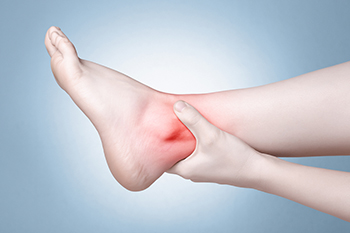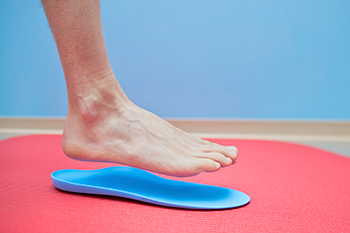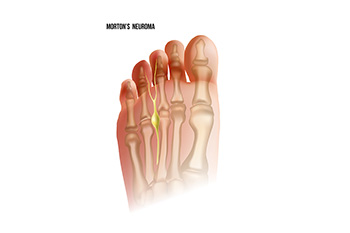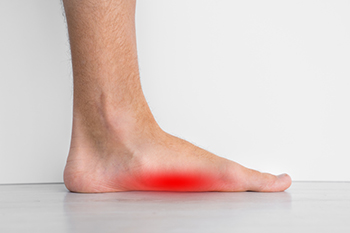
Freehold (732) 294-9393

Freehold (732) 294-9393

Tarsal tunnel syndrome is an infrequent condition characterized by damage to the tibial nerve, one of the major nerves in the body. It is typically caused by compression within the tarsal tunnel, which is a narrow passage located inside the ankle. This compression, known as entrapment neuropathy, occurs due to the restricted space formed by bones and soft tissues in the area. The tibial nerve, along with certain blood vessels and tendons, passes through the tarsal tunnel. It is responsible for moving and feeling things in the lower leg and foot. However, the term tarsal tunnel syndrome is commonly used to describe any discomfort or pain along the tibial nerve. This syndrome can stem from various underlying causes, including injury to the foot or ankle, flat feet or fallen arches, and medical conditions, such as diabetes or arthritis. Individuals affected by tarsal tunnel syndrome may experience pain, a burning sensation, or tingling along the path of the tibial nerve. If you have foot or ankle pain, it is suggested that you make an appointment with a podiatrist for a proper diagnosis and treatment.
Tarsal tunnel syndrome can be very uncomfortable to live with. If you are experiencing tarsal tunnel syndrome, contact Dr. Henry Miller of New Jersey. Our doctor can provide the care you need to keep you pain-free and on your feet.
Tarsal Tunnel Syndrome
Tarsal tunnel syndrome, which can also be called tibial nerve dysfunction, is an uncommon condition of misfiring peripheral nerves in the foot. The tibial nerve is the peripheral nerve in the leg responsible for sensation and movement of the foot and calf muscles. In tarsal tunnel syndrome, the tibial nerve is damaged, causing problems with movement and feeling in the foot of the affected leg.
Common Cause of Tarsal Tunnel Syndrome
The Effects of Tarsal Tunnel Syndrome
A physical exam of the leg can help identify the presence of tarsal tunnel syndrome. Medical tests, such as a nerve biopsy, are also used to diagnose the condition. Patients may receive physical therapy and prescriptive medication. In extreme cases, some may require surgery.
If you have any questions please feel free to contact our office located in Freehold, NJ . We offer the newest diagnostic and treatment technologies for all your foot and ankle needs.

There are specific foot conditions that may require patients to wear orthotics. They can range from having flat feet to other abnormal foot structures. Orthotics are defined as custom-made inserts for shoes and are designed to correct certain foot ailments. Having foot or heel pain may guide a patient toward inquiring about orthotics, and this information is often provided by a podiatrist. This type of doctor will perform a foot examination that can reveal existing deformities. This can be followed by having a conversation about current activities that are performed, which may help to determine the cause of the pain. Medical conditions that may improve by wearing orthotics can include arthritis, bunions, flat feet, and hammertoe. There are various types of orthotics that can be worn, and it is suggested that you confer with a podiatrist who can determine if this is the best course of treatment for you.
If you are having discomfort in your feet and would like to try orthotics, contact Dr. Henry Miller from New Jersey. Our doctor can provide the care you need to keep you pain-free and on your feet.
What Are Orthotics?
Orthotics are inserts you can place into your shoes to help with a variety of foot problems such as flat feet or foot pain. Orthotics provide relief and comfort for minor foot and heel pain but can’t correct serious biomechanical problems in your feet.
Over-the-Counter Inserts
Orthotics come in a wide variety of over-the-counter inserts that are used to treat foot pain, heel pain, and minor problems. For example, arch supports can be inserted into your shoes to help correct overarched or flat feet, while gel insoles are often used because they provide comfort and relief from foot and heel pain by alleviating pressure.
Prescription Orthotics
If over-the-counter inserts don’t work for you or if you have a more severe foot concern, it is possible to have your podiatrist prescribe custom orthotics. These high-quality inserts are designed to treat problems such as abnormal motion, plantar fasciitis, and severe forms of heel pain. They can even be used to help patients suffering from diabetes by treating foot ulcers and painful calluses and are usually molded to your feet individually, which allows them to provide full support and comfort.
If you are experiencing minor to severe foot or heel pain, it’s recommended to speak with your podiatrist about the possibilities of using orthotics. A podiatrist can determine which type of orthotic is right for you and allow you to take the first steps towards being pain-free.
If you have any questions please contact our office located in Freehold, NJ . We offer the newest diagnostic and treatment technologies for all your foot and ankle needs.

Foot pain is a common ailment. It can happen in different areas of the foot and for various reasons. Pain that occurs between the third and fourth toes may indicate Morton’s neuroma has developed. It is a condition that affects the nerve between these toes and causes it to become compressed and irritated. Morton’s neuroma is generally caused by wearing shoes that do not have enough room in the toe area, such as high heels. It is beneficial to choose a shoe with a wider toe box if high heels are desired to be worn. Common symptoms that are associated with Morton’s neuroma can consist of a burning or tingling sensation, and many people feel as if there is a small pebble in their shoe or sock. Relief may be found in the beginning stages of Morton’s neuroma by wearing shoes that fit correctly. For progressed cases, it may be necessary for a more invasive treatment to be performed. If you have pain in this part of your foot, it is suggested that you seek the counsel of a podiatrist who can effectively diagnose and offer correct treatment options for Morton’s neuroma.
Morton’s neuroma is a very uncomfortable condition to live with. If you think you have Morton’s neuroma, contact Dr. Henry Miller of New Jersey. Our doctor will attend to all of your foot care needs and answer any of your related questions.
Morton’s Neuroma
Morton's neuroma is a painful foot condition that commonly affects the areas between the second and third or third and fourth toe, although other areas of the foot are also susceptible. Morton’s neuroma is caused by an inflamed nerve in the foot that is being squeezed and aggravated by surrounding bones.
What Increases the Chances of Having Morton’s Neuroma?
Morton’s neuroma is a very treatable condition. Orthotics and shoe inserts can often be used to alleviate the pain on the forefront of the feet. In more severe cases, corticosteroids can also be prescribed. In order to figure out the best treatment for your neuroma, it’s recommended to seek the care of a podiatrist who can diagnose your condition and provide different treatment options.
If you have any questions, please feel free to contact our office located in Freehold, NJ . We offer the newest diagnostic and treatment technologies for all your foot care needs.

Adults who have flat feet may experience pain. It can happen occasionally or constantly, and often requires shoes that are worn to have adequate arch support. The majority of babies are born with flat feet, and an abnormal foot structure may cause the feet to remain that way through adulthood. Flat feet may also develop in people who become overweight, as a result of the added pressure the feet endure. Additionally, existing medical conditions such as diabetes, and rheumatoid arthritis may lead to getting flat feet, and it may also happen to people as the aging process occurs. The possibility of spraining or fracturing the ankle may increase as the ankle rolls inward while walking, often causing the gait to change. Many patients find relief when specific stretches are performed that target strengthening the arch, and wearing orthotics may help to diminish any discomfort from having flat feet. If you have this foot condition, it is strongly suggested that you are under the care of a podiatrist who can offer you relief options.
Flatfoot is a condition many people suffer from. If you have flat feet, contact Dr. Henry Miller from New Jersey. Our doctor will treat your foot and ankle needs.
What Are Flat Feet?
Flatfoot is a condition in which the arch of the foot is depressed and the sole of the foot is almost completely in contact with the ground. About 20-30% of the population generally has flat feet because their arches never formed during growth.
Conditions & Problems:
Having flat feet makes it difficult to run or walk because of the stress placed on the ankles.
Alignment – The general alignment of your legs can be disrupted, because the ankles move inward which can cause major discomfort.
Knees – If you have complications with your knees, flat feet can be a contributor to arthritis in that area.
Symptoms
Treatment
If you are experiencing pain and stress on the foot you may weaken the posterior tibial tendon, which runs around the inside of the ankle.
If you have any questions please feel free to contact our office located in Freehold, NJ . We offer the newest diagnostic and treatment technologies for all your foot and ankle needs.